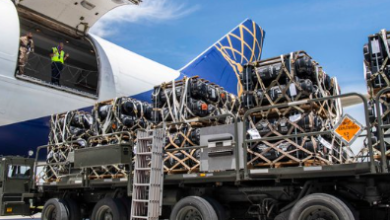NATO Countries Talk Big About Beefing Up Defense Spending, But Most Haven’t Backed Up Pledges

Most NATO countries have failed to meet pledges to inflate defense spending made in reaction to Russia’s invasion of Ukraine despite voicing concerns about the intense security environment in Europe, according to The Wall Street Journal.
NATO countries on the eastern flank, most notably Poland, are girding for war as the conflict in Ukraine shows no sign of abating in the near term, prompting renewed commitments to beefing up their own and Ukraine’s militaries in line with the U.S., according to the WSJ. Others believe that Russia’s poor performance in Ukraine, illustrated in recent days by an incursion of pro-Ukrainian partisans into a Russian border territory with little initial resistance, means there is less urgency to increase spending on weapons and military equipment than previously imagined, according to the outlet.
Germany is the most stark example of the latter. In 2023, Germany will fall $18.5 billion short of the 2% of GDP spending benchmark NATO countries are pledged to meet, while Poland will spend almost the same amount beyond that threshold, the WSJ reported, citing a recent analysis from Germany’s IFO Institute.
Canada, Spain and Italy, meanwhile, are spending less relative to GDP than last year, according to the WSJ.
In 2022, only seven of NATO’s 30 members met the minimum 2% of GDP threshold, according to the NATO Secretary General’s annual report, released in March. Germany spent about 1.5% of GDP on defense in 2022, according to the report.
In comes after many NATO countries in 2022 promised to increase spending, but those in the West are moving at a slower pace than those in the East, according to the WSJ.
Days after the Russian invasion of Ukraine in February of that year German Chancellor Olaf Scholz vowed to boost spending past the 2% threshold, Reuters reported. He also created a special $108 billion fund for military investments from the 2022 budget.
More than a year later, German defense spending has changed little, and the investment fund remains virtually unutilized, according to the WSJ. If it keeps at the current pace, it may never reach the 2% target and could backslide over time, the outlet reported, citing economists.
Germany’s defense ministry disputed that assertion, saying defense spending would reach that minimum over the average of the next five years, according to the WSJ.
“So in a given year, it could be more or it could be less, depending on whether the money appropriated can be spent,” a spokesperson told the outlet.
Poland, on the other hand, leads NATO military spending at 4.3%, more than double what it spent relative to GDP before the Ukraine war, according to the WSJ.
The German federal government office did not immediately respond to the Daily Caller News Foundation’s request for comment.
Content created by The Daily Caller News Foundation is available without charge to any eligible news publisher that can provide a large audience. For licensing opportunities of our original content, please contact licensing@dailycallernewsfoundation.org




